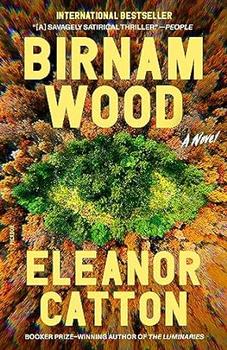Summary | Excerpt | Reading Guide | Reviews | Beyond the Book | Readalikes | Genres & Themes | Author Bio

A Novel
by Eleanor Catton
Her parents had been surprised by her vocation. Like many ardent followers of politics, they tended towards impatience when it came to the processes of natural change; they were indifferent gardeners, and had kept a compost heap more to reduce the volume of their household waste than out of any fascination for its uses. The backyard of Mira's childhood home had been mostly laid to lawn. There was a raised bed against the bottom fence that Mira's father had turned into a sandpit when she was very young, only to be abandoned when the neighbourhood cats began to use it as a litter box. It had stayed untouched for almost a decade, the plastic starfish and crenellated buckets fading to pastel against the darkening crust of sand, before anyone raised the prospect of restoring the bed to its proper function – which had happened, Mira could remember exactly, on the evening of her first day of high school. At her Year 9 induction she had been paired with a girl named Emily Alcorn whose lunch contained the unimaginable sophistication of cherry tomatoes, basil leaves, and baby mozzarella balls, each ingredient stored in a separate compartment and then combined, with great ritual and solemnity, on the back of her lunchbox lid. Mira had been entranced. She had rushed home to beg her mother to begin buying cherry tomatoes instead of regular, and her mother, who at the time was reading a self-help book on the power of initiative, had replied that maybe she should try to grow her own.
The challenge was accepted with far more seriousness than it had been made. By the following year, Mira had two dozen different crops in germination, and had extended the reconverted sandpit the full length of the fence. She planted marigolds as pesticides, planned crop rotations, built cold frames and hotbeds, saved the family's coffee grounds for mulch; and the more her parents wondered at her perseverance, the more she persevered. With her schoolmates, however, she was intensely secretive, and took to pushing soft soap beneath her fingernails before she gardened, to make it easier afterwards to wash away the dirt. She knew that horticulture was a strange passion for a teenage girl, and for all her inherent unconventionality she was not above the adolescent terror of exposure, the dread of never being normal and never fitting in. Emily Alcorn had long since moved on to other friends and no doubt other lunches, but she remained for Mira a kind of private benchmark of refinement and good taste – an image that was largely fantasy, since they had hardly spoken on the day of their induction, and after it, they never spoke again.
None of Mira's boyfriends had ever lasted more than a couple of months, and because she had never been the kind of girl to claim best-friendships, it had come almost as a shock to recognise, belatedly, that her relationship with Shelley had been the closest and most constant of her adult life. She was ashamed to realise how completely she had taken Shelley's friendship for granted, all the more because a source of private guilt for her was the fact – never openly acknowledged – that deep down, she preferred the company of men. Her favoured style of conversation was impassioned argument that bordered on seduction, and although it was distasteful, not to mention tactically unwise, to admit that one enjoyed flirtation, she never felt freer, or funnier, or more imaginatively potent than when she was the only woman in the room. If ever this preference were to be pointed out to her, Mira knew that she would stridently deny it. She felt that it exposed a defect in her character – disloyalty to her own sex, first of all, but deeper than that, a vanity, an appetite, a capacity for manipulation that she would rather other people did not see; she knew, and was ashamed to know, that one of the reasons she had never taken Shelley's friendship all that seriously was that it lacked any sense of sexual possibility or contest. There was no danger between them, nothing fearsome or uncertain, no provocation, no romance; with Shelley, she always knew that she was safe.
Excerpted from Birnam Wood by Eleanor Catton. . Published by Farrar, Straus and Giroux. Copyright © 2023 by Eleanor Catton. All rights reserved.
If you want to build a ship, don't drum up people... but rather teach them to long for the endless immensity of the...
Click Here to find out who said this, as well as discovering other famous literary quotes!
Your guide toexceptional books
BookBrowse seeks out and recommends the best in contemporary fiction and nonfiction—books that not only engage and entertain but also deepen our understanding of ourselves and the world around us.